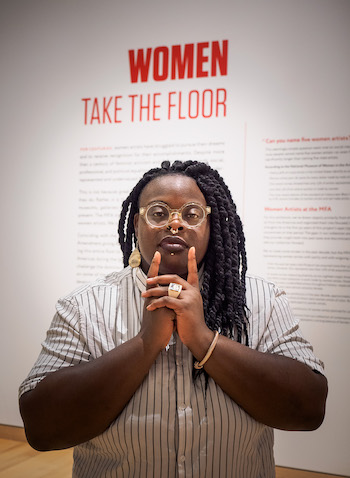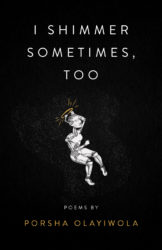Author Interview: Boston’s Poet Laureate — Porsha Olayiwola
By Robert Israel
“I wrote those poems because I think people need to read the truth and to hear the truth about romantic sensibilities between gay people.”

Porsha Olaylwola. Photo: courtesy of the Museum of Fine Arts.
Porsha Olayiwola, 31, Boston’s Poet Laureate, has a commanding presence. When she speaks — as she did, for example, at press conference last month in the glass-enclosed Shapiro Courtyard at Boston’s Museum of Fine Arts — the room quickly hushes. Her voice is matched in intensity only by her stature: long black dreadlocks, dark eyes glimpsed behind large, clear plastic frames.
Olayiwola was named Boston’s Poet Laureate in January, 2019. Originally from Chicago, she was named the 2014 World Poetry Slam Champion, and the 2015 National Poetry Slam Champion. Her poem, Boston Ode can be found on the City of Boston’s website.
Olayiwola speaks in a holler, a whisper, a roar. At the MFA, a video recording of her reciting one of her poems is included the exhibition, Women Take the Floor, (Arts Fuse review) which focuses on overlooked and underrepresented work as on women artists during the past century.
I caught up briefly with Olayiwola — she was dashing between appointments. She spoke from her home in Jamaica Plain in advance of the publication of her new book, I Shimmer Sometimes, Too (Button Poetry/Exploding Pinecone Press, Minneapolis, MN).
A celebration of the book’s release will take place at the Boston Public Library on November 18. (Check with the BPL online calendar for specific time and location).
Arts Fuse: Does the position of Boston Poet Laureate come with specific responsibilities?
Olayiwola: It’s really up to the individual poet who becomes the laureate how to define what he or she does. There is really nothing explicitly laid out. I’ve been very involved giving public readings, with making sure poetry is accessible, doing free programming, and working as artistic director of MassLEAP, a literary non-profit serving youth artists. We’re working to establish the Youth Poet Laureate. And this fall we’ll be in the public schools doing readings and exploring with young people what it means to be a poet. There are several organizations tied together promoting writing, poetry, and the role of young people in the city, and I’ve been involved in all of them.
AF: There are several of poems in your new book that describe growing up in Chicago’s Southside. As a youngster there, you witnessed a lot of racial violence. Are you finding this same tension, or have things improved?
Olayiwola: The violence in the inner city that I experienced, the anxiety of it, persists, maybe not in exactly the same way as I experienced it, but it persists with the same anxiety that it is going to happen. I’m a futurist. I write about that, and I’m hopeful, but the anxiety persists, just in a different way.
 AF: I Shimmer Sometimes, Too includes several poems that deal with graphic — and very personal — descriptions of gay sexuality. What reactions have you had about these poems?
AF: I Shimmer Sometimes, Too includes several poems that deal with graphic — and very personal — descriptions of gay sexuality. What reactions have you had about these poems?
Olayiwola: I wrote those poems because I think people need to read the truth and to hear the truth about romantic sensibilities between gay people. And to read about sex portrayed that way, queer sex, brings it to the forefront.
AF: Published pieces about you use several labels to describe you, including “queer-dyke,” “hip-hop feminist,” “womanist,” to mention just a few. You use the word “dyke” to call attention to yourself throughout your book. Are you comfortable with all these labels?
Olayiwola: I am comfortable — I do not find these labels offensive. They are malleable. People are using labels differently. It’s a different time. Labels can be unifying.
AF: Is labeling changing within the gay community?
Olayiwola: In some respects. There is a constant shift in the labeling of gay people, and I think it is getting better. It is certainly not getting better for folks who are transsexual. Transsexual folks are experiencing life and death on the streets. They are experiencing verbal death and physical death on the street. We are all learning a new lexicon. But clarity is not the battle — the issue is survival. It is survival that is important.
Robert Israel writes about theater, travel, and the arts, and is a former member of Independent Reviewers of New England (IRNE). He can be reached at risrael_97@yahoo.com.
